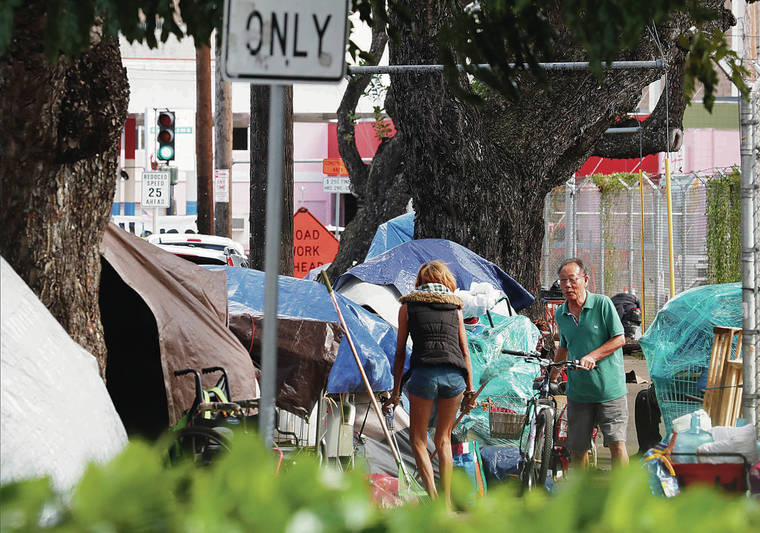Oahu residents don’t feel as good about living here as they did in 2006 or even a year ago, according to a recent survey Opens in a new tab.
Asked to sum up the overall quality of life in Honolulu, 14% of those polled rated it as excellent, and 40% said it was good. The rest rated overall quality of life as fair or poor.
The 54% positive quality-of-life rating (adding the excellent and good ratings together) tallied in December is a significant drop from the 77% quality-of-life rating given when the same poll was asked as part of the Honolulu Community Livability report 13 years earlier. The rating stayed at 70% or higher through 2012 and then dropped to 62%-68% from 2014 to 2017.
When compared with folks surveyed in other communities, the 54% quality-of-life rating is also a lower figure than other, mainland cities. Out of 433 communities that were asked the quality- of-life question, Honolulu ranked 391st, which is in the 10th percentile.
Those are among the findings of the 2019 Honolulu Community Livability Report Opens in a new tab released Tuesday by the Office of the City Auditor. Honolulu is among 600 cities taking part in what’s known as the National Community Survey, conducted annually by the Colorado-based National Research Center Inc. along with the International City/County Management Association.
The auditor’s office mailed out 1,700 surveys to random households on the island, and 376 responses were received. The margin of error is 5%.
A lot fewer Oahu residents today believe Honolulu is a good place to retire or raise children than people did in the past.
In 2019, only 39% of those surveyed rated Honolulu as an excellent or good place to retire. That’s down from 68% in 2006. In 2019, 53% rated Honolulu positively when asked whether the Gathering Place is a place to raise children, down from 71% in 2006.
A whopping 76% of those polled in 2019 ranked Honolulu as an excellent or good place to visit. But only 53% said they were very likely or somewhat likely to recommend Honolulu as a place to live if someone asked. Nearly 1 in 4 Oahu residents surveyed, or 24%, said it was “somewhat unlikely” or “very unlikely” they would remain in Honolulu for the next five years.
Of the declines from 2018 to 2019, acting city Auditor Troy Shimasaki referenced the recent convictions of former Honolulu Police Chief Louis Kealoha and his wife, former Deputy Prosecuting Attorney Katherine Kealoha, as well as the subpoenas for records issued by federal prosecutors looking into impropriety at the Honolulu Authority for Rapid Transportation and the city’s $9.2 billion rail project.
“Over the last year, I feel like there is a general sense of frustration and distrust in city government, in part due to two high-profile corruption cases,” Shimasaki said.
A broad multitude of questions were asked of those polled on everything from the city’s bulky item program, climate change and police services to their worries about the island’s drinking water, the impact of the homeless population and ethics and transparency in government.
>> 51% rated police service as excellent or good; that number was 74% in 2006.
>> 13% rated the city’s ability to enforce its land use and zoning codes as excellent or good; that number was 49% in 2006.
>> 56% called shoreline erosion and the loss of beaches a major problem, and 33% called it a moderate problem.
>> 57% described the city’s need to address the impact of homelessness in the next two years as essential, 38% as very important.
>> 59% called the need to protect Honolulu’s drinking water from potential Navy fuel storage tank leaks essential, 31% very important.
Overall, Oahu residents surveyed showed little faith in city government and its ability to deal with today’s most pressing issues.
>> 16% rated the value of services for taxes paid as excellent or good; that number was 68% in 2006.
>> 17% had confidence in the City and County of Honolulu government in general. That question was not asked until 2013, when 23% had confidence.
>> 17% felt city government is acting in the best interest of Honolulu, and 19% believe it is being honest.
>> 52% deemed it essential for the city to strengthen its ethics, transparency and accountability; 33% called it very important.
Alexander Zannes, a spokesman for Mayor Kirk Caldwell, said the mayor is still reviewing the report. Zannes noted, however, that “there are a number of categories that are not under the purview of the city and county.”
Shimasaki said the drop in confidence in government and the overall displeasure over how people feel about Honolulu may be indicative of the times. “I don’t think there is any one particular thing, but could be a general reflection of a mix of what is going on at the federal, state and local government levels,” he said.
Among community characteristics, only 46% had an overall feeling of safety. Yet 83% felt positive about being safe in their own neighborhoods.
To see the survey, go to bit.ly/HNLNCS2020 Opens in a new tab.
QUALITY OF LIFE
The percentage of Honolulu residents who say the quality of life in the city is excellent or good has been steadily dropping since 2006 when 77% gave it a thumbs-up. Last year the number was 54%, according to the National Community Survey for Honolulu.
2019 the National Community… by Honolulu Star-Advertiser on Scribd

